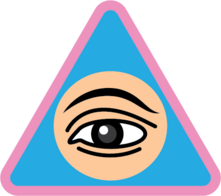
Back كاو دائية Arabic كاو دائيه ARZ Каадай BE Cao Dai BJN ক্যাও দাই Bengali/Bangla Caodaisme Catalan Kaodaismus Czech Cao Dai Danish Caodaismus German Kaodaismo EO


Caodaism (/ˌkaʊˈdaɪzəm/; Vietnamese: Đạo Cao Đài; chữ Hán: 道高臺, IPA: [ʔɗaːw˧˨ʔ kaːw˧˧ ʔɗaːj˨˩]) or Cao Đài is a Vietnamese monotheistic syncretic religion that retains many elements from Vietnamese folk religion such as ancestor worship,[citation needed] as well as "ethical precepts from Confucianism, occult practices from Taoism, theories of karma and rebirth from Buddhism, and a hierarchical organization from Roman Catholicism".[1] It was officially established in the city of Tây Ninh in Southern Vietnam in 1926.
The full name of the religion is Đại Đạo Tam Kỳ Phổ Độ (chữ Hán: 大道三期普度 'The Great Faith [for the] Third Universal Redemption').[2]
Adherents engage in practices such as prayer, veneration of ancestors, nonviolence, and vegetarianism with the goal of union with God and freedom from saṃsāra.[3] Estimates of the number of Caodaists in Vietnam vary; government figures estimate 4.4 million Caodaists affiliated to the Cao Đài Tây Ninh Holy See, with numbers rising up to 6 million if other branches are added.[4][5][6][7][8]
The United Nations found about 2.5 million Cao Dai followers in Vietnam as of January 2015.[9][10] An additional number of adherents in the tens of thousands, primarily ethnic Vietnamese, live in North America, Cambodia, Europe and Australia as part of the Cao Dai diaspora.

- ^ Carrasco et al. 1999, pp. 182–183.
- ^ Hoskins 2012a, p. 3.
- ^ Hoskins 2015, pp. 1–28.
- ^ UNHCHR 2014.
- ^ Hoskins 2015, p. 4; 239.
- ^ Eller 2014, pp. 184–186, 188.
- ^ Hoskins 2012a, p. 4.
- ^ Hoskins 2012b.
- ^ "A_HRC_28_66_Add.2_E.doc". ohchr.org. 30 January 2015. Archived from the original on 2 August 2021. Retrieved 17 March 2020.
- ^ "Cao Dai (Vietnamese religion)". Encyclopedia Britannica. Archived from the original on 7 January 2019. Retrieved 17 March 2020.
[B]y the early 1990s, Cao Dai was reported to have some two million adherents in Vietnam, Cambodia, France, and the United States.